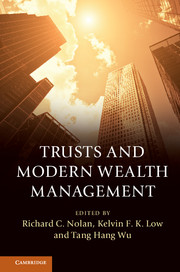Book contents
- Trusts and Modern Wealth Management
- Trusts and Modern Wealth Management
- Copyright page
- Contents
- Contributors
- Introduction
- Part I
- Part II
- Part III
- 13 Mapping Client Sophistication
- 14 Misrepresentation and Rescission
- 15 The Alternative Australian Trusts Act (Cth)
- 16 Non-Charitable Purpose Trusts
- 17 Trusts in Civil Law Environments
- 18 High-Net-Worth Trusts in the Twenty-First Century
- Index
18 - High-Net-Worth Trusts in the Twenty-First Century
Confiscatory Taxes and Duties?
from Part III
Published online by Cambridge University Press: 19 April 2018
- Trusts and Modern Wealth Management
- Trusts and Modern Wealth Management
- Copyright page
- Contents
- Contributors
- Introduction
- Part I
- Part II
- Part III
- 13 Mapping Client Sophistication
- 14 Misrepresentation and Rescission
- 15 The Alternative Australian Trusts Act (Cth)
- 16 Non-Charitable Purpose Trusts
- 17 Trusts in Civil Law Environments
- 18 High-Net-Worth Trusts in the Twenty-First Century
- Index
Summary
- Type
- Chapter
- Information
- Trusts and Modern Wealth Management , pp. 529 - 575Publisher: Cambridge University PressPrint publication year: 2018



